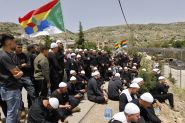- Home
- Middle East
- Silent Protest in Damascus Demands Justice for Assad Regime's Disappeared
A silent crowd gathered in the Syrian capital, Damascus, on Friday to press the new authorities about the fate of relatives who went missing under Bashar al-Assad and to demand justice for their loved ones.
The fate of tens of thousands of people who disappeared under Assad, who was ousted on December 8 by a coalition of Islamist-led rebels, is a key question after more than 13 years of devastating civil war that saw upwards of half a million people killed.
Dozens of protesters holding pictures of the disappeared assembled in central Damascus's Hijaz Square, an AFP journalist said.
"It is time for tyrants to be held accountable," read a black banner unfurled from the balcony of the elegant Ottoman-era train station.
Other placards read: "Revealing the fate of the missing is a right," and "I don't want an unmarked grave for my son; I want the truth."
Such a demonstration would have been unthinkable under Assad's rule, but it is now possible under the new authorities dominated by the Islamist group Hayat Tahrir al-Sham, which led the offensive that overthrew him.
"Unfortunately, for many years we were united in the grief of absence and uncertainty, waiting for our loved ones, one amnesty after another," said Wafa Mustafa in a speech in the midst of the protesters.
Her father, Ali, was arrested in 2013.
"We all saw the scenes of prisoners being freed. It was a source of joy, but it was also very difficult because we did not see our own loved ones among them," she said.
"We are here to say we will not accept anything less than the whole truth, to know what happened to our relatives, who tortured them, and if they were buried, where they are," she added.
“He died instantly”
Amani al-Hallaq, 28, was seeking news about where to find the remains of her cousin, who was kidnapped in 2012 when he was a student dentist.
"I was once one of those who was afraid. This is the first time I am protesting," the 28-year-old Amani said.
Her cousin was abducted as he came out of the university, said the young woman in a headscarf.
"They pulled out his nails. He died instantly," she said.
"We want to know where the disappeared are, their bodies, so we can identify them."
On Monday, three NGOs called on Syria's new authorities to ensure that proof of the "atrocities" committed under Assad rule was preserved.
On Thursday, security forces arrested a military justice official of the toppled government.
Activists say Mohammed Kanjo Hassan issued death sentences for thousands of people held in the notorious Saydnaya prison near Damascus.
Saydnaya was the site of extrajudicial executions, torture, and forced disappearances. It epitomized the crimes committed against Assad's opponents.
Holding a picture of his cousin, who was tortured to death in jail in 2012, Yussef al-Sammawi said he had come from Germany.
He said he wanted justice to be done and former officials to be held to account—but "in a fair way that provides relief to the families so they can live in this country."
Jonathan Sawaya, with AFP
Read more



Comments